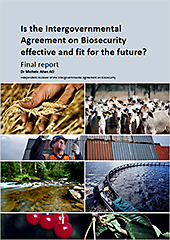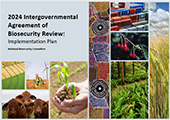Dr Michele Allan AO was appointed on 22 May 2024 as independent reviewer of the Intergovernmental Agreement on Biosecurity (IGAB).
Is the Intergovernmental Agreement on Biosecurity effective and fit for the future? Final report
This report fulfils the requirement for the IGAB to be reviewed every 5 years, or sooner if required, and makes recommendations on improvements to the implementation and effectiveness of the IGAB.
If you have difficulty accessing these files, contact us for help.
Preamble
The 2019 Intergovernmental Agreement on Biosecurity (IGAB) is an agreement between the Commonwealth of Australia, and state and territory governments to strengthen the biosecurity system. The agreement recognises that biosecurity is a shared responsibility between all governments, industry, natural resource managers, custodians or users, and aims to strengthen these partnerships.
The IGAB establishes nationally agreed approaches to prevent, prepare for, detect and mitigate biosecurity risks, and respond to, manage and recover from biosecurity incidents should they occur. The review will examine the principles, goals and objectives, components and governance arrangements and responsibilities of the intergovernmental agreement and consider whether there are further opportunities to improve the operation of the agreement.
This review will report to Commonwealth, state and territory ministers responsible for biosecurity matters on findings and any recommendations for improvement. The review will determine where adjustments to the IGAB are needed to ensure that the biosecurity system operates effectively, efficiently and with sufficient responsiveness and continues to support market access for Australian products, to minimise primary production costs and to support a healthy economy, environment and community.
Scope
The IGAB review will consider and provide recommendations on the following:
- the implementation and effectiveness of each section of the current agreement, in particular examining whether any clauses in the agreement inhibit any activity required to prevent, prepare for, detect and mitigate biosecurity risks, and respond to, manage and recover from biosecurity incidents should they occur, or whether any additional elements are required to prevent, prepare for, detect and mitigate biosecurity risks, and respond to, manage and recover from biosecurity incidents should they occur.
- existing cost-sharing arrangements and the potential for implementation of new funding arrangements for cross-jurisdictional biosecurity activities.
- the impacts of Covid on the functioning of the IGAB and if any consequential amendments may be required.
- not duplicate efforts from previous and ongoing reviews and assessments of the biosecurity system noting that consideration and implementation of some of the recommendations from these may still be underway.
The review will be led by an independent reviewer and supported by a secretariat team established within the Australian Government Department of Agriculture, Fisheries and Forestry. The National Biosecurity Committee (NBC) will be the primary steering committee for the review and decisions will be made by the Agriculture Ministers Meeting (AMM) via consideration by Agriculture Senior Officials Committee (AGSOC) members. The reviewer will provide a final report, including recommendations, to ministers, within 8 months of appointment.
Consultation
As required under IGAB Clause 53, during the review process input will be sought from a range of participants in the national biosecurity system. Consultation will extend to governments, industries (including agricultural and environmental), and community members.
Background
The inaugural IGAB between the Commonwealth and all state and territory governments (except Tasmania) commenced in 2012. In 2015, responsible ministers agreed to initiate a review of the national biosecurity system and its underpinning IGAB. This review, completed in 2017, made 42 recommendations aimed at strengthening Australia’s biosecurity system over the following 5 to 10 years, and resulted in endorsement of the second IGAB being endorsed by First Ministers in 2019.
In the second (current) IGAB, clause 53 requires that Parties must, within 5 years from commencement, and every 5 years afterwards (or earlier if considered necessary) initiate an independent review of the implementation and effectiveness of the IGAB. To fulfil this requirement, the review needs to be initiated before 3 January 2024.
In March 2023, the NBC agreed to the approach for the proposed IGAB review that avoided duplicating or adding unnecessarily to the existing national reform agenda.
Release of the independent review of the Intergovernmental Agreement on Biosecurity by Dr Michele Allan AO
19 August 2025
Australia’s agriculture ministers today released the independent review of the Intergovernmental Agreement on Biosecurity (IGAB), Is the Intergovernmental Agreement on Biosecurity effective and fit for the future? Final report, which was completed by Dr Michele Allan AO.
The current version of the IGAB commenced in 2019, and is an agreement between the Commonwealth, state and territory governments to strengthen the national biosecurity system.
It defines the roles and responsibilities of governments and outlines the priority areas for collaboration to minimise the impact of pests and diseases on Australia’s economy, environment and community. As such, the IGAB is an important component of Australia’s national biosecurity system.
Overall, the review found that the IGAB itself is effective but that improvements can be made in implementing the IGAB to strengthen Australia’s national biosecurity system.
Agriculture ministers thank Dr Allan AO for reviewing this important agreement and for her expertise in producing this report.
Agriculture ministers have today also issued a joint response to the review.
Following this, the National Biosecurity Committee will develop a joint implementation plan, containing the detail of actions against recommendations, for release within the next 4 months.
More information on the IGAB review is available from the 2024 Intergovernmental Agreement on Biosecurity Review website, which will be updated once the implementation plan is available.
19 August 2025
As the Australian, state and territory government ministers responsible for biosecurity we present our joint response to the 2025 report of the independent review of the Intergovernmental Agreement on Biosecurity (IGAB), Is the Intergovernmental Agreement on Biosecurity effective and fit for the future? Final report.
This is the second review of the IGAB. Agriculture ministers commissioned this review in May 2024 to meet the requirement for an independent review to be initiated within 5 years from commencement of the latest agreement. The review specifically considered:
- the implementation and effectiveness of the IGAB
- the existing cost sharing arrangements and the potential for the implementation of new funding arrangements for cross-jurisdictional biosecurity activities
- the impacts of COVID-19 on the functioning of the IGAB
- not duplicating efforts from previous and ongoing reviews and assessments of the biosecurity system.
The IGAB defines the roles and responsibilities of governments and outlines the priority areas for collaboration to minimise the impact of pests and diseases on Australia’s economy, environment and community.
Our national biosecurity system protects agriculture, forestry and fisheries exports worth $75.6 billion in 2023-24, international tourism worth up to $50 billion, environmental assets worth more than $5.7 trillion, and more than 1.6 million jobs. All this, which provides us with the way of life we value so much, will be at risk if we fail to maintain a strong focus on biosecurity and managing potential threats. Not only do we depend on a healthy environment for fresh water, fresh food and a prosperous society, but it also allows us to protect the culture and values of our wider community and First Nations people.
There are an increasing number of challenges to Australia’s biosecurity system. They include exotic pests and diseases spreading around the world and putting unprecedented pressure on our borders, agriculture, fisheries and forestry, environment and way of life. As such, the IGAB is an important component of Australia’s national biosecurity system because it defines our whole-of-government approach to biosecurity.
The independent review confirmed that the current version of the IGAB is effective and is the foundation for maintaining collaboration across governments in managing Australia’s biosecurity. While the report verified that the cost-sharing and funding clauses of the IGAB are clear, and that no changes were needed to the IGAB to support its functioning during any future pandemics, effective implementation of the principles of the IGAB is essential to fully harness the benefits of this intergovernmental framework.
The report raises some areas where the implementation of the IGAB would benefit from a stronger focus and makes 7 recommendations to this end. Our response agrees to recommendations 1–5 and 7 in full and agrees-in-principle to recommendation 6.
Recommendations agreed in full by governments include:
- greater inclusion and collaboration with First Nations peoples in our biosecurity system
- greater coordination across research and innovation funders
- sharpening the communication and operation of the National Biosecurity Committee structures
- suggested considerations for the conduct of future reviews of the IGAB.
Recommendation 6 involves consideration of delaying any potential future reviews of biosecurity cost sharing and funding until recommendations from previous reviews, and work scheduled in the National Biosecurity Strategy Action Plan ‘Sustainable Investment’ priority are finalised. This recommendation is agreed-in-principle, as governments acknowledge the constantly changing and increasingly complex biosecurity global environment and the need to calibrate funding arrangements to meet changing needs.
Our response demonstrates our continuing commitment to the objective of the IGAB: to strengthen Australia’s biosecurity system through enhanced national collaboration among Australian governments.
Many of the actions required to deliver these recommendations align with activities already underway as part of a strategic re-focus of the National Biosecurity Committee, and through the National Biosecurity Strategy Action Plan, delivering on the 10-year roadmap for Australia’s biosecurity system. As such, we are already taking action on addressing these areas and strengthening the implementation of our shared responsibility.
As the Australian, state and territory government ministers responsible for biosecurity we re‑affirm the vital role of a strong biosecurity system to protect Australia from potentially devastating pest and disease outbreaks, safeguarding our national economy, our agriculture, fisheries and forestry industries, our regional communities and our unique environment.
Agriculture ministers have tasked the National Biosecurity Committee to implement these activities and commitments in collaboration with industry, biosecurity stakeholders and the wider community. The National Biosecurity Committee will publish a joint implementation plan, containing the detail of actions against recommendations before the end of 2025.
| Minister | Portfolio | Jurisdiction |
|---|---|---|
| The Hon Julie Collins MP | Minister for Agriculture, Fisheries and Forestry | Australian Government |
| The Hon Tara Moriarty MLC | Minister for Agriculture | New South Wales |
| The Hon Ros Spence MP | Minister for Agriculture | Victoria |
| The Hon Anthony (Tony) Perrett | Minister for Primary Industries | Queensland |
| The Hon Jackie Jarvis MLC | Minister for Agriculture and Food, forestry, Small Business | Western Australia |
| The Hon Clare Scriven MLC | Minister for Primary Industries and Regional Development | South Australia |
| The Hon Gavin Pearce MP | Minister for Primary Industries and Water | Tasmania |
| Suzanne Orr MLA | Minister for Climate Change, Environment, Energy and Water | Australian Capital Territory |
| Hon Gerard Maley MLA | Minister for Agriculture and Fisheries | Northern Territory |
Australia’s agriculture ministers have asked the National Biosecurity Committee (NBC) to lead the implementation of the 2024 Intergovernmental Agreement on Biosecurity (IGAB) Review recommendations, as relevant.
This high-level implementation plan outlines the implementation approach with leads and timeframes. Ongoing monitoring, evaluation and reporting of implementation progress will be provided as part of the National Biosecurity Strategy (NBS) monitoring, evaluation and reporting framework. This framework will be finalised in early 2026.
2024 Intergovernmental Agreement on Biosecurity Review: Implementation Plan
If you have difficulty accessing these files, contact us for help.


